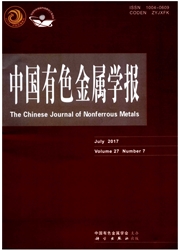

 中文摘要:
中文摘要:
采用直流四电极法研究了常压下Sn-Zn合金系的电阻率随温度连续升温的变化规律。结果表明:合金Sn-Zn5、Sn-Zn8.8、Sn-Zn20、Sn-Zn30、Sn-Zn40、Sn-Zn50和Sn-Zn70分别在970、1008、957、950、948、926和873℃处发生了电阻率的突变现象。对合金的进一步分析表明,Sn-Zn熔体电阻率在高温时的突变是由Zn在Sn-Zn熔体中大量汽化造成的,即在此处发生了液-气结构转变;Sn-Zn合金在完全熔化至发生液-气结构转变的连续升温过程中,合金中并不存在某种液-液结构的转变,且液-液结构转变并非存在于在所有二元合金系中。
 英文摘要:
英文摘要:
The change rule of electrical resistivity with the increase of temperatures of tin-zinc (Sn-Zn) alloys with different compositions were investigated using the direct current four-probe technique at constant pressure. The results show that some transitions occur at the temperatures of 970, 1 008, 957, 950, 948, 926 and 873 ℃. According to the analysis of the resistivity-temperature (p-t) curves, the obtained significant abnormal variation of the electrical resistivity at high temperature of Sn-Zn alloys is considered to be caused by the abundant gasification of Zn component in Sn-Zn alloys, namely the liquid-gas structure transition takes place in melts, And no temperature-induced llquid-liquid structure transition exists in Sn-Zn melts.
 同期刊论文项目
同期刊论文项目
 同项目期刊论文
同项目期刊论文
 期刊信息
期刊信息
